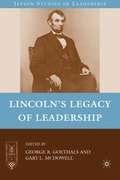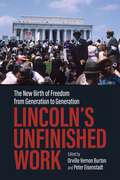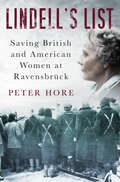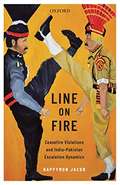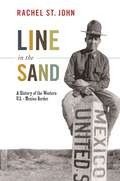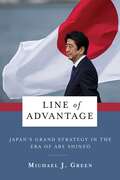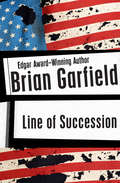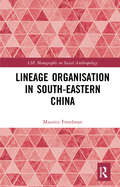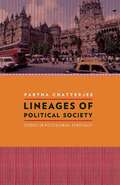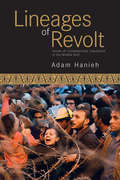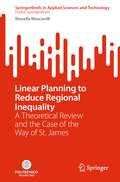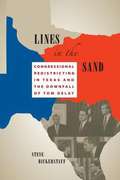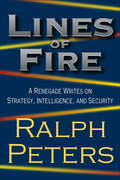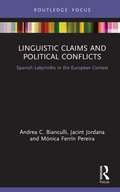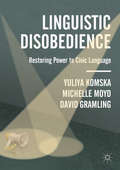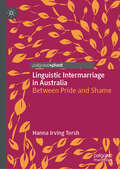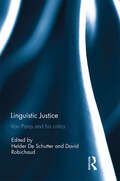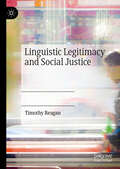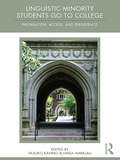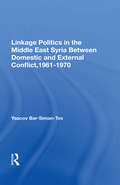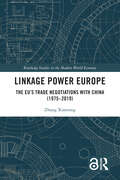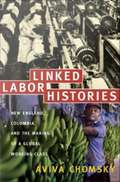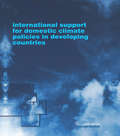- Table View
- List View
Lincolnomics: How President Lincoln Constructed the Great American Economy
by John F. WasikA biography of Abraham Lincoln that examines his untold legacy as the Great Builder of American infrastructure. Abraham Lincoln&’s view of the right to fulfill one&’s economic destiny was at the core of his governing philosophy―but he knew no one could climb that ladder without strong federal support. Some of his most enduring policies came to him before the Civil War, visions of a country linked by railroads running ocean to ocean, canals turning small towns into bustling cities, public works bridging farmers to market. Expertly appraising the foundational ideas and policies on infrastructure that America&’s sixteenth president rooted in society, John F. Wasik tracks Lincoln from his time in the 1830s as a young Illinois state legislator pushing internal improvements; through his work as a lawyer representing the Illinois Central Railroad in the 1840s; to his presidential fight for the Transcontinental Railroad; and his support of land-grant colleges that educated a nation. To Lincoln, infrastructure meant more than the roads, bridges, and canals he shepherded as a lawyer and a public servant. These brick-and-mortar developments were essential to a nation&’s lifting citizens above poverty and its isolating origins. Lincolnomics revives the disremembered history of how Lincoln paved the way for Eisenhower&’s interstate highways and FDR&’s social amenities. With an afterword addressing the failure of American infrastructure during the COVID-19 pandemic, and how Lincoln&’s policies provide a guide to the future, Lincolnomics makes the case for the man nicknamed &“The Rail Splitter&” as the Presidency&’s greatest builder. &“In this unique blend of biography and policy prescription, journalist Wasik . . . casts Abraham Lincoln as America&’s &“foremost moral architect of economic and social opportunity&” and looks to his life and political career for lessons in how the nation might rebuild its infrastructure and redress income inequality. . . . Wasik convincingly argues that [Lincoln&’s] economic policies deserve more credit.&” —Publishers Weekly &“While revealing as history, Wasik&’s account about the first Republican President&’s launches of infrastructure shame the ignorant, obstinate, narcissist Republicans of today who wish instead to build up tyrant Trump&’s political infrastructure. This is a book to be read and used today.&” —Ralph Nader &“Wasik invented a new word for this book because his theme bears new force: Abraham Lincoln sought a better-built nation and a freer legal space to help every individual, regardless of background, to aspire and rise. Most historians know this too vaguely about Lincoln; Wasik finally gives the great democratic idea the prominence it deserves.&” —James M. Cornelius, Ph.D., editor, Journal of the Abraham Lincoln Association
Lincoln’s Legacy of Leadership
by Gary L. Mcdowell George R. GoethalsAn in-depth look at Abraham Lincoln's leadership, both before and during his presidency. Lincoln led through times of confusion, war, and dissent. The set of chapters included in this volume are based on papers that constituted part of the 2008-2009 Jepson Leadership Forum at the Jepson School of Leadership Studies at the University of Richmond.
Lincoln’s Unfinished Work: The New Birth of Freedom from Generation to Generation
by Eric Foner Richard Carwardine Mark Schultz Jerald Podair Gavin Wright Stephen Kantrowitz William Haller J. William Harris Randall Stephens Joshua Casmir Catalano Greg Downs James Loewen Lawrence McDonnell Adrienne Petty Briana Pocratsky Rhondda ThomasIn his Gettysburg Address, Abraham Lincoln promised that the nation’s sacrifices during the Civil War would lead to a “new birth of freedom.” Lincoln’s Unfinished Work analyzes how the United States has attempted to realize—or subvert—that promise over the past century and a half. The volume is not solely about Lincoln, or the immediate unfinished work of Reconstruction, or the broader unfinished work of America coming to terms with its tangled history of race; it investigates all three topics.The book opens with an essay by Richard Carwardine, who explores Lincoln’s distinctive sense of humor. Later in the volume, Stephen Kantrowitz examines the limitations of Lincoln’s Native American policy, while James W. Loewen discusses how textbooks regularly downplay the sixteenth president’s antislavery convictions. Lawrence T. McDonnell looks at the role of poor Blacks and whites in the disintegration of the Confederacy. Eric Foner provides an overview of the Constitution-shattering impact of the Civil War amendments. Essays by J. William Harris and Jerald Podair examine the fate of Lincoln’s ideas about land distribution to freedpeople. Gregory P. Downs focuses on the structural limitations that Republicans faced in their efforts to control racist violence during Reconstruction. Adrienne Petty and Mark Schultz argue that Black land ownership in the post-Reconstruction South persisted at surprisingly high rates. Rhondda Robinson Thomas examines the role of convict labor in the construction of Clemson University, the site of the conference from which this book evolved. Other essays look at events in the twentieth and twenty-first centuries. Randall J. Stephens analyzes the political conservatism of white evangelical Christianity. Peter Eisenstadt uses the career of Jackie Robinson to explore the meanings of integration. Joshua Casmir Catalano and Briana Pocratsky examine the debased state of public history on the airwaves, particularly as purveyed by the History Channel. Gavin Wright rounds out the volume with a striking political and economic analysis of the collapse of the Democratic Party in the South.Taken together, the essays in this volume offer a far-reaching, thought-provoking exploration of the unfinished work of democracy, particularly as it pertains to the legacy of slavery and white supremacy in America.
Lindell's List: Saving British and American Women at Ravensbrück
by Peter HoreAlready a decorated heroine of the First World War, British-born Mary Lindell, Comtesse de Milleville, was one of the most colourful and courageous agents of the Second World War, yet her story has almost been forgotten. Evoking the spirit of Edith Cavell, and taking the German occupation of Paris in 1940 as a personal affront, she led an escape line for patriotic Frenchmen and British soldiers. After imprisonment, escape to England, a secret return to France and another arrest, she began to witness the horrors of German-run prisons and concentration camps. In April 1945, a score of British and American women emerged from the Women’s Hell – Ravensbrück concentration camp – who had been kept alive by the willpower and the strength of one woman, Mary Lindell. She combined a passion for adventure with blunt speech and persistently displayed the greatest personal bravery in the face of great adversity. To counter German claims that they had no British or American prisoners, Mary smuggled out a plea for rescue and produced her list from her pinafore pocket, compiled in secret from the camp records. This vital list contained the names of captured women, many of whom were agents of British Military Intelligence, the Special Operations Executive or the French Resistance. Poignantly supported by first-hand testimony, Lindell’s List tells the moving story of Mary Lindell’s heroic leadership and the endurance of a group of women who defied the Nazis in the Second World War.
Line On Fire: Ceasefire Violations And India-pakistan Escalation Dynamics (Oxford International Relations In South Asia)
by Sumit Ganguly E. Sridharan Happymon JacobThe India–Pakistan border in Jammu & Kashmir has witnessed repeated ceasefire violations (CFVs) over the past decade. As relations between India and Pakistan have deteriorated, CFVs have increased exponentially. It is imperative to gain a deeper understanding of these violations owing to their potential to not only cause a crisis but also escalate an ongoing one. Line on Fire, part of the Oxford International Relations in South Asia series, postulates that the incorrect diagnosis of the reasons behind CFVs has led to wrong policies being adopted by both India and Pakistan to deal with the recurrent violations. Using fresh empirical data and first-hand accounts, the volume attempts to understand the reason why CFVs continue to take place between India and Pakistan despite consistent efforts to reduce the tension between the two nations. In doing so, it recontextualizes and enriches the prevailing arguments in contemporary literature on escalating dynamics and unenduring ceasefire agreements between the two South Asian nuclear rivals.
Line in the Sand: A History of the Western U.S.-Mexico Border (America in the World #11)
by Rachel St. JohnThe first transnational history of the U.S.-Mexico borderLine in the Sand details the dramatic transformation of the western U.S.-Mexico border from its creation at the end of the Mexican-American War in 1848 to the emergence of the modern boundary line in the first decades of the twentieth century. In this sweeping narrative, Rachel St. John explores how this boundary changed from a mere line on a map to a clearly marked and heavily regulated divide between the United States and Mexico. Focusing on the desert border to the west of the Rio Grande, this book explains the origins of the modern border and places the line at the center of a transnational history of expanding capitalism and state power in the late nineteenth and early twentieth centuries.Moving across local, regional, and national scales, St. John shows how government officials, Native American raiders, ranchers, railroad builders, miners, investors, immigrants, and smugglers contributed to the rise of state power on the border and developed strategies to navigate the increasingly regulated landscape. Over the border's history, the U.S. and Mexican states gradually developed an expanding array of official laws, ad hoc arrangements, government agents, and physical barriers that did not close the line, but made it a flexible barrier that restricted the movement of some people, goods, and animals without impeding others. By the 1930s, their efforts had created the foundations of the modern border control apparatus.Drawing on extensive research in U.S. and Mexican archives, Line in the Sand weaves together a transnational history of how an undistinguished strip of land became the significant and symbolic space of state power and national definition that we know today.
Line of Advantage: Japan’s Grand Strategy in the Era of Abe Shinzō (Contemporary Asia in the World)
by Michael GreenNo other country has devised a grand strategy for managing China’s rising economic and military power as deliberately or successfully as Japan. Seeking to counter Chinese ambitions toward regional hegemony, Japan has taken an increasingly assertive role in East Asia and the world. During the tenure of Prime Minister Abe Shinzo, the country pursued closer security cooperation with the United States and other democracies, established a more centralized national defense system, and advanced rules and norms to preserve the open regional order in the Indo-Pacific that is crucial to its prosperity and survival—all while managing an important economic relationship with China.In Line of Advantage, Michael J. Green provides a groundbreaking and comprehensive account of Japan’s strategic thinking under Abe. He explains the foundational logic and the worldview behind this approach, from key precedents in Japanese history to the specific economic, defense, and diplomatic priorities shaping contemporary policy toward China, the United States, the two Koreas, and the Indo-Pacific region. Drawing on two decades of access to Abe and other Japanese political, military, and business leaders, Green provides an insider’s perspective on subjects such as how Japan pursued competition with China without losing the benefits of economic cooperation. Assessing the strengths and weaknesses of Japan’s new active role, Line of Advantage sheds new light on a period with profound implications for the future of U.S. competition with China and international affairs in Asia more broadly.
Line of Succession
by Brian GarfieldFive bombs upend the foundation of the American governmentSturka is an artist with explosives. A sturdy man approaching middle age, he learned his trade on the darkest battlefields of the twentieth century: Indochina, Palestine, Guyana, Biafra, and the fetid jungles of South America, where he fought alongside Che Guevera but was quick enough not to die with him. He doesn&’t know where his new employers hail from; he only knows how well they pay. Today he packs plastic explosive into the false bottoms of three handbags and two suitcases, to be left at strategic locations around Washington, D.C. But this is no ordinary café bombing. Today Sturka targets the men at the top of the American government. The attack causes a crisis of succession, the likes of which America has never seen. If the right man doesn&’t take charge quickly, the country will tear itself apart.
Lineage Organisation in South-Eastern China (LSE Monographs on Social Anthropology)
by Maurice FreedmanThis essay is the work of a social anthropologist but it is not based upon field work. It is concerned with Chinese matters but it is not written by a sinologue. In this essay are the author’s reflections on certain aspects of southeastern Chinese society during the last hundred and fifty years, with attention on the Fukien and Kwangtung region of China has it has specialized not only in large-scale unilineal organization but also in sending people overseas.
Lineages of Political Society: Studies in Postcolonial Democracy (Cultures of History)
by Partha ChatterjeePartha Chatterjee, a pioneering theorist known for his disciplinary range, builds on his theory of "political society" and reinforces its salience to contemporary political debate. Dexterously incorporating the concerns of South Asian studies, postcolonialism, the social sciences, and the humanities, Chatterjee broadly critiques the past three hundred years of western political theory to ask, Can democracy be brought into being, or even fought for, in the image of Western democracy as it exists today? Using the example of postcolonial societies and their political evolution, particularly communities within India, Chatterjee undermines the certainty of liberal democratic theory in favor of a realist view of its achievements and limitations. Rather than push an alternative theory, Chatterjee works solely within the realm of critique, proving political difference is not always evidence of philosophical and cultural backwardness outside of the West. Resisting all prejudices and preformed judgments, he deploys his trademark, genre-bending, provocative analysis to upend the assumptions of postcolonial studies, comparative history, and the common claims of contemporary politics.
Lineages of Revolt
by Adam HaniehWhile the outcomes of the tumultuous uprisings that continue to transfix the Arab world remain uncertain, the root causes of rebellion persist. Drawing upon extensive empirical research, Lineages of Revolt tracks the major shifts in the region's political economy over recent decades. In this illuminating and original work, Adam Hanieh explores the contours of neoliberal policies, dynamics of class and state formation, imperialism and the nature of regional accumulation, the significance of Palestine and the Gulf Arab states, and the ramifications of the global economic crisis. By mapping the complex and contested nature of capitalism in the Middle East, the book demonstrates that a full understanding of the uprisings needs to go beyond a simple focus on "dictators and democracy."
Linear Planning to Reduce Regional Inequality: A Theoretical Review and the Case of the Way of St. James (SpringerBriefs in Applied Sciences and Technology)
by Rossella MoscarelliThis book explores the advantages of a linear model of planning in reducing regional inequalities. Linear planning, commonly discussed in the past as a method which plans the development of the city, is completely redefined here in the form of a design approach inspired by projects shaped by linear routes, such as cycle or walking paths. Such concept is applied to the urgent topic of territorial marginality which specifically neglects rural and mountainous areas and recently is coped by European and National policies. The analysis of these policies demonstrates the necessity of alternative strategies equipped to deal with both the internal and external causes that determine the critical conditions in these fragile environments. By implementing the concept of linear planning in these contexts, this book proposes to enlarge the perspective of traditional policies contrasting the regional inequalities that usually determine the design of projects just within the boundaries of the marginal areas. Cycle and walking paths are experimental cases of linear planning as they have not been influenced or formed by political boundaries and therefore are able to equally involve both the central and marginal zones. This book presents a review of current issues such as regional inequalities, with attention to their related policies, as well as an analysis of the concept of linear planning as seen through the study of one of the most famous cases of a walking path—the Way of St. James in Spain.
Lines in the Sand
by Steve BickerstaffThe events of 2003 in Texas were important to the political history of this country. Congressman Tom DeLay led a Republican effort to gerrymander the state's thirty-two congressional districts to defeat all ten of the Anglo Democratic incumbents and to elect more Republicans; Democratic state lawmakers fled the state in an effort to defeat the plan. The Lone Star State uproar attracted attention worldwide. The Republicans won this showdown, gaining six additional seats from Texas and protecting the one endangered Republican incumbent. This outcome has undeniably affected national policy-making and has made it more difficult for Democrats to regain a majority in the U. S. House of Representatives. Some of the methods used by DeLay to achieve this result, however, led to his criminal indictment and ultimately to his downfall. With its eye-opening research, readable style, and insightful commentary, Lines in the Sand provides a front-line account of what happened in 2003, often through the personal stories of members of both parties and of the minority activist groups caught in a political vortex. Law professor Steve Bickerstaff provides much-needed historical perspective and also probes the aftermath of the 2003 redistricting, including the criminal prosecutions of DeLay and his associates and the events that led to DeLay's eventual resignation from the U. S. House of Representatives.
Lines of Fire: A Renegade Writes on Strategy, Intelligence, and Security
by Ralph PetersThe New York Times–bestselling military analyst offers a collection of essays covering a generation of geopolitics and military policy. For decades, Ralph Peters has been the most provocative and visionary American writer on military affairs, strategy, security, and intelligence. In that time, he predicted every major trend that has plagued the post-Cold-War world. A career military officer and acclaimed author, he has faced issues ranging from the explosion of religious terrorism to the fatal weaknesses of our intelligence system and our dangerous over-reliance on technology. Now Peters delves into these and other enduringly vital themes in this definitive, career-spanning collection of his writings. Lines of Fire is an indispensable volume for understanding today&’s crises—and tomorrow&’s.
Linguistic Claims and Political Conflicts: Spanish Labyrinths in the European Context (Routledge Advances in European Politics)
by Andrea C. Bianculli Jacint Jordana Mónica Ferrín PereiraThis book explores and assesses the multiple levels at which linguistic policies can be challenged, devised and enacted, i.e. sub-national, national and supranational, and the variety of state and non-state actors involved. Moving beyond descriptive and normative approaches, it provides an empirical comparative assessment of the policy responses and strategies deployed to deal with linguistic diversity and conflicts in Spain, a country where almost one third of the population is at least bilingual in their own languages. The Spanish case is then assessed within the European context, both from the perspective of multilevel influence and mutual interaction, and from the learning experiences it may entail for similar or equivalent problems and disputes occurring at the European level or beyond. This text will be of key interest to scholars and students of Spanish politics, linguistics, identity politics and more broadly of European politics and governance, public policy, education and communication policy and comparative politics.
Linguistic Disobedience: Restoring Power to Civic Language
by Yuliya Komska Michelle Moyd David GramlingThis book asks how we—as citizens, immigrants, activists, teachers—can counter the abuse of language in our midst. How can we take back the power of language from those who flaunt that power to silence or erase us and our fellows? In search of answers, Linguistic Disobedience recalls ages and situations that made critiquing, correcting, and caring for language essential for survival. From turn-of-the-twentieth-century Central Europe to the miseries of the Third Reich, from the Movement for Black Lives to the ongoing effort to decolonize African languages, the study and practice of linguistic disobedience have been crucial. But what are we to do today, when reactionary supremacists and authoritarians are screen-testing their own forms of so-called disobedience to quash oppositional social justice movements and their languages? Blending lyric essay with cultural criticism, historical analysis, and applied linguistics, Linguistic Disobedience offers suggestions for a hopeful pathway forward in violent times.
Linguistic Intermarriage in Australia: Between Pride and Shame
by Hanna Irving TorshThis book examines the experiences of couples with different language backgrounds and different cultural origins as they negotiate love, partnership and parenting. It is based on the author’s doctoral research into the attitudes and experiences of the English-speaking background (ESB) partners of non-English-speaking background (NESB) migrants in Sydney, Australia. In particular, it seeks to understand how these English speakers negotiate being in a romantic relationship with someone who has a different first language. It explores how those from an ESB reconcile the negative perspectives of Anglophone culture towards “other” languages, with their desire to be a good partner who respects the linguistic differences in their relationship. The book is organised into six chapters, which move from a focus on the language of the individual, to the languages of the couple, and then to the wider family. The main finding is that although ESB partners had very different beliefs and attitudes towards language learning to their migrant partners, they attempted to compensate for these differences in various ways. It will be of particular interest to students and scholars in the fields of language education, minority languages, and language policy and planning.
Linguistic Justice: Van Parijs and his Critics
by David HelderThe world contains over 6000 languages and less than 200 states to accommodate them. This creates the important normative question of how to respond politically to linguistic diversity. What is a just language policy? Are language minorities entitled to language protection? Should language rights be accorded to immigrants? Is the universal rise of English as a lingua franca to be applauded or to be regretted? The most important and comprehensive thinker within this debate over linguistic justice is Philippe Van Parijs. In his bold and controversial theory of linguistic justice, Van Parijs argues that the rise of English is a good thing, as well as that all language groups are entitled to grab a territory on which only their language receives public recognition. This collection, bringing together some of the most influential contemporary political philosophers, presents a critical review of Van Parijs’s theory and gives a state-of-the-art overview of the prevailing positions on linguistic justice within political philosophy. It will be of interest to students and scholars studying philosophy, politics, linguistics, international relations and law. This book was published as a special issue of Critical Review of International Social and Political Philosophy.
Linguistic Legitimacy and Social Justice
by Timothy ReaganThis book examines the nature of human language and the ideology of linguistic legitimacy – the common set of beliefs about language differences that leads to the rejection of some language varieties and the valorization of others. It investigates a broad range of case studies of languages and dialects which have for various reasons been considered 'low-status' including: African American English, Spanglish, American Sign Language, Yiddish, Esperanto and other constructed languages, indigenous languages in post-colonial neo-European societies, and Afrikaans and related language issues in South Africa. Further, it discusses the implications of the ideology of linguistic legitimacy for the teaching and learning of foreign languages in the US. Written in a clear and accessible style, this book provides a readable and pedagogically useful tool to help readers comprehend the nature of human language, and the ways in which attitudes about human language can have either positive or negative consequences for communities and their languages. It will be of particular interest to language teachers and teacher educators, as well as students and scholars of applied linguistics, intercultural communication, minority languages and language extinction.
Linguistic Minority Students Go to College: Preparation, Access, and Persistence
by Yasuko Kanno Linda HarklauCurrently, linguistic minority students – students who speak a language other than English at home – represent 21% of the entire K-12 student population and 11% of the college student population. Bringing together emerging scholarship on the growing number of college-bound linguistic minority students in the K-12 pipeline, this ground-breaking volume showcases new research on these students’ preparation for, access to, and persistence in college. Other than studies of their linguistic challenges and writing and academic literacy skills in college, little is known about the broader issues of linguistic minority students’ access to and success in college. Examining a variety of factors and circumstances that influence the process and outcome, the scope of this book goes beyond students’ language proficiency and its impact on college education, to look at issues such as student race/ethnicity, gender, SES, and parental education and expectations. It also addresses structural factors in schooling including tracking, segregation of English learners from English-fluent peers, availability and support of institutional personnel, and collegiate student identity and campus climate. Presenting state-of-the-art knowledge and mapping out a future research agenda in an extremely important and yet understudied area of inquiry, this book advances knowledge in ways that will have a real impact on policy regarding linguistic minority immigrant students’ higher education opportunities.
Linkage Politics In The Middle East: Syria Between Domestic And External Conflict, 1961-1970
by Yaacov Bar-siman-tovTraditional studies of linkage politics tend to assume that internal political instability leads a government to divert attention from internal problems by initiating an external conflict or stressing the pressures of international problems. In contrast, quantitative studies typically conclude that there is little or no relationship between interna
Linkage Power Europe: The EU’s Trade Negotiations with China (1975-2019) (Routledge Studies in the Modern World Economy)
by Zhang XiaotongThis book looks at the history of the EU’s trade negotiations with China from 1975 to 2019 from a distinctive perspective – the EU as a linkage power. The author explains how the EU through linkage strategies speaks with one voice, overcomes its weakness in military capabilities and translates its non-military capabilities into advantages and influences in some specific policy areas. The book systematically traces the European negotiators’ tactics in managing the EU’s trade relations with China. It’s the first time that the history of EU–China trade negotiations is presented to the public by a seasoned trade negotiator. The author, combining the identities of a negotiator and a scholar, gives a panoramic view of EU–China trade relations from 1975, when the European Economic Community established diplomatic relations with China, to 2019 when the Juncker Commission leaves office. This book will appeal to policymakers, think-tankers, professors and students, as well as anyone who is interested in trade policies and negotiations in the EU and China.
Linked Labour Histories: New England, Colombia, and the Making of a Global Working Class
by Aviva ChomskyExploring globalization from a labor history perspective, Aviva Chomsky provides historically grounded analyses of migration, labor-management collaboration, and the mobility of capital. She illuminates the dynamics of these movements through case studies set mostly in New England and Colombia. Taken together, the case studies offer an intricate portrait of two regions, their industries and workers, and the myriad links between them over the long twentieth century, as well as a new way to conceptualize globalization as a long-term process. Chomsky examines labor and management at two early-twentieth-century Massachusetts factories: one that transformed the global textile industry by exporting looms around the world, and another that was the site of a model program of labor-management collaboration in the 1920s. She follows the path of the textile industry from New England, first to the U. S. South, and then to Puerto Rico, Japan, Mexico, Central America, the Caribbean, and Colombia. She considers how towns in Rhode Island and Massachusetts began to import Colombian workers as they struggled to keep their remaining textile factories going. Most of the workers eventually landed in service jobs: cleaning houses, caring for elders, washing dishes. Focusing on Colombia between the 1960s and the present, Chomsky looks at the Urab banana export region, where violence against organized labor has been particularly acute, and, through a discussion of the AFL-CIO's activities in Colombia, she explores the thorny question of U. S. union involvement in foreign policy. In the 1980s, two U. S. coal mining companies began to shift their operations to Colombia, where they opened two of the largest open-pit coal mines in the world. Chomsky assesses how different groups, especially labor unions in both countries, were affected. Linked Labor Histories suggests that economic integration among regions often exacerbates regional inequalities rather than ameliorating them.
Linking Emissions Trading Schemes (Climate Policy Ser.)
by Andreas TuerkA growing number of GHG emissions trading schemes are being implemented at regional or national levels. However, even as the number of different schemes grows, few linkages exist between them. Major cap-and-trade proposals are currently at important stages in their development, especially in the United States, Japan and Australia, some of which explicitly emphasize the aim of linking with other schemes. One of the strategic goals of European climate policy is linking the EU ETS with other comparable schemes. The research presented in this volume is on actual economic, political and institutional constraints and implications. It examines the role of linking trading schemes for the development of the post-Kyoto climate architecture and for increasing linkage between schemes. This essential research will be relevant to both the scientific community and for policymakers who are involved in the design of emerging trading schemes and offset mechanisms, as well as in designing the post Kyoto climate regime. This volume focuses specifically on: o Economic, institutional/regulatory and legal dimensions of linking o Implications of linking on the design of emerging trading schemes o The role of linking trading schemes for the development of the post-Kyoto climate regime
Linking Global Trade and Human Rights
by Daniel Drache Lesley A. JacobsDuring the global economic crisis of 2008, countries around the world used national policy spaces to respond to the economic crisis in ways that shed new light on the possibilities for linkages between international trade and human rights. This book introduces the idea of policy space as an innovative way to reframe recent developments in global governance. It brings together a wide-ranging group of leading experts in international law, trade, human rights, political economy, international relations, and public policy who have been asked to reflect on this important development in globalization. Their multidisciplinary contributions provide explanations for why the global landscape for national policy space has changed, clearly illustrate instances of this change, and project the future paths for policy development in social and economic policy spaces, especially with reference to linkages between international trade and human rights in countries from the Global North as well as Brazil, China, and India.

